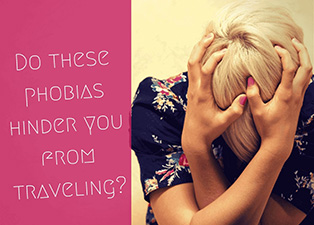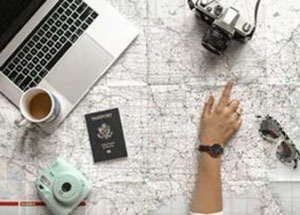Do you have anyone in your family or friend-circle who bucks the trend of vacation or travel? The reason they often cite to refrain from traveling may be a trivial health issue, a sudden official meeting, or even an out of the blue project submission, though the real cause may be probably one of these phobias looming around their weird mentation.
But before getting into each of them, I would like to give you a brief on what a phobia actually is. It simply refers to a state where a person displays a strong, irrational persistent fear on a particular object, situation, or an activity, which in actuality poses little or no threat at all. A variety of reasons contribute to the emergence of a phobia, including genetic factors, hereditary, and interference of certain life incidents with brain-chemistry.
Escalaphobia
This denotes the ‘fear of escalator.’ Using the escalators, for many, is like a child’s play. Of course it’s, and many times you might’ve come across little ones chirpily climbing up and down this giant machine as if they are playing in a fun park. But mind you; this may not be acceptable for your ‘escalaphobia’ friend.
Ancraophobia
How would your dear one ever dare to travel when he or she has an unexplainable fear of the wind? Also termed as anemophobia, this little-known phobia can be truly a debilitating situation for those who experience it.
Hodophobia
This is plainly the fear of travel, although the symptoms that the sufferer may display can be emotional, mental, or even physical. In fact, it is a complex condition wherein the victim’s fear of travel may be associated with several numerous situations, from fear of trains and automobiles to paranoiac towards strangers or certain places.
Atephobia
If your travel mate is atephobic, i.e. scared of ruins, you can never blame him in fabricating a reason to avoid a trip to a dilapidated or ruined building or fort that is covered in your travel itinerary.
Nomophobia
Technically, this term represents the fear of being without a cell phone contact. Rather than referring it as a phobia, I would like to coin this particular condition as a rising ‘menacing trend’ among youngsters including me.
Limnophobia
Your limnophobic friend will be relieved and may join you in traveling, if you’re willing to remove those intrepid water activities from your travel plan. While Limnophobia is typically correlated to the phobia of lakes, in certain circumstances, it is also used to describe a panic or terror associated with other misty bodies of water, such as swamps, ponds, and marshes.
Cryophobia
Planning for a vacation to a winter spot? Your spouse or companion who has a fear of cryophobia would turn down your invitation without a second thought. A cryophobic person not only fears of being cold but also anything associated with cold temperature, such as frost, freezing, and even eating or drinking cold stuffs.
Agrizoophobia
Despite being labeled as the places offering ultimate vacation experiences, a visit to such destinations as Everglades, Kenya, Botswana, Costa Rica, and Belize may not interest a person with Agrizoophobia. The reason is the presence of abundant wildlife species in these regions.
Disposophobia
Also known as hoarding disorder, this category of phobia stems from an intense fear of losing or getting rid of a particular stuff. A person affected by this condition would sometimes find difficulty in discarding a thing, which for others is menial, like restaurant bills, old mail, worn-out clothes etc.
Aviophobia
It is commonly known as the flying phobia. Besides causing anxiety and inexplicable fear, aviophobia would certainly take a toll on the sufferer’s health, leading to headache, sweating, muscle tension, shortness of breath, and difficulty in concentrating.
Emetophobia
If you or your friend is afraid of vomiting or even scared of seeing others vomiting, you’re likely to be an emetophobic. Grouped under the panic disorder, it is a common condition and often related to eating disorders as well as obsessive compulsive disorder.
The good news is that these phobias are both manageable and curable. Once you’re aware of the underlying cause of your dear ones’ phobia or anxiety disorder, you can help them to uproot the condition by encouraging them to undergo cognitive-behavioral therapy, create goals, and most of all, implement certain self-help strategies like simple breathing exercise, which in turn will help to stay calm in a tension-provoking situation.
So don’t let the gloom of these phobias take over the potential pleasure and gains of your upcoming travel. Speak to your friend to know the actual reason of aversion towards traveling. A simple step from your side can go a long way and of course would reflect the quality of both of your lives.








